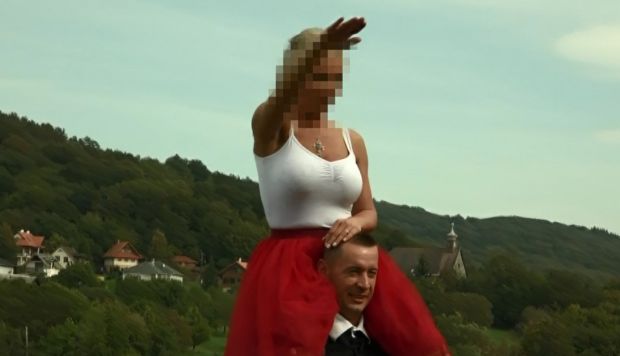Today, as Hungary’s leftist and liberal parties cozy up to Jobbik in mounting anti-government demonstrations and calling for a unified coalition in the campaign for the European Parliamentary elections in May, where are those voices now?
The silence is deafening. As certain international media outlets cheer on the anti-government forces, going to great effort to try to portray a flailing opposition campaign as some sort of mass movement, they have turned a blind eye to Jobbik’s deeply disturbing anti-Semitism.
Now, we get this.

Hungarian media published this picture showing Jobbik President Tamás Sneider’s wife raising a Nazi salute in wedding photos. Consider that image for a moment and let’s recall what exactly we’re dealing with in Jobbik – in their own words.
“To convert to the Muslim faith,” said Sneider, in a recording that resurfaced this week in the Hungarian press, “is much better than if he had converted to the Jewish faith.”
Jobbik’s former president, Gábor Vona, said that “we cannot allow the gypsies to become a majority in our sacred homeland”. “The most accurate description of Jobbik,” said Vona, “is that it is a national, radical party” that has “set out on a fight against global capitalism and its three main representatives: the US, the EU and Israel.” Sounds like a program the international media should really get behind!
Vice Chairman Előd Novák promised to “put an end to the Holocaust industry in the film business” after the Hungarian film Son of Saul won an Oscar for best foreign language film in 2016. A Jobbik member of parliament spat in the “Shoes on the Danube Bank,” a well-known Holocaust memorial in Budapest and sent a photo to his fellow party members, bragging about the act.
I could go on. It’s ugly.
The fact is, no government has done more to fight anti-Semitism in Hungary than the governments of Prime Minister Orbán. And, by the way, the prime minister has condemned Jobbik and its extremism in no uncertain terms.
So here’s a little challenge to colleagues in the international media covering Hungary: Ask the leaders of these opposition parties whether they condemn the anti-Semitism of Jobbik. Ask them whether they are planning to cooperate with an extremist, far-right party in this election campaign. The first journalist to do it – and publish it – wins a prize!
